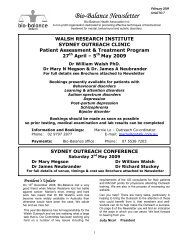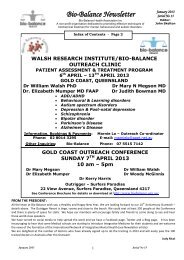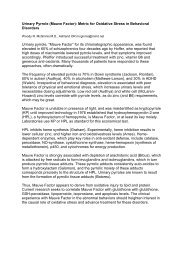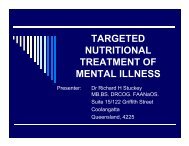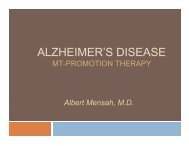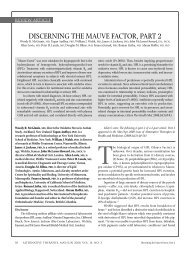Download PDF - Bio-Balance Health
Download PDF - Bio-Balance Health
Download PDF - Bio-Balance Health
Create successful ePaper yourself
Turn your PDF publications into a flip-book with our unique Google optimized e-Paper software.
than those at depleted levels. The most common nutrients in overload<br />
include copper, iron, folic acid, calcium, methionine, manganese, choline,<br />
and omega-6 fatty acids. Of course, these same nutrients may be in<br />
deficiency in other persons.<br />
I am amused by supplement manufacturers who attempt to develop the<br />
ideal combination of vitamins, minerals, and amino acids for the general<br />
population. This is a bit like trying to determine the ideal shoe size for the<br />
population. The truth is that multiple vitamins and minerals are too<br />
indiscriminate, and may do as much harm as good.<br />
Each of us should ask the question, "Who am I nutritionally?" The answer<br />
to this question is important for all, but may be especially critical for<br />
persons with mental health problems.<br />
Nutrients and Mental <strong>Health</strong><br />
As we enter the new millennium, the medical and scientific communities<br />
agree on the tremendous influence of neurotransmitters on behavior<br />
disorders, ADHD, depression, and schizophrenia. Most persons with these<br />
disorders were born with a predisposition for these problems due to<br />
genetically-aberrant levels of specific neurotransmitters. Our mental health<br />
is dependent upon having the proper amounts of these critical brain<br />
chemicals.<br />
Some psychiatrists express their scorn for nutrient therapies, claiming that<br />
they are too puny to have any real clinical potency. They often say, "You<br />
really need a drug medication to get the job done for a serious condition<br />
like depression." My favorite response begins by asking the question,<br />
"Where do our neurotransmitters come from?"<br />
The brain is a chemical factory which produces serotonin. dopamine,<br />
norepinephrine, and other brain chemicals 24 hours a day. The only raw<br />
material for these syntheses are nutrients, namely amino acids, vitamins,<br />
minerals, etc. If the brain receives improper amounts of these nutrient<br />
building blocks, we can expect serious problems with our<br />
neurotransmitters.



